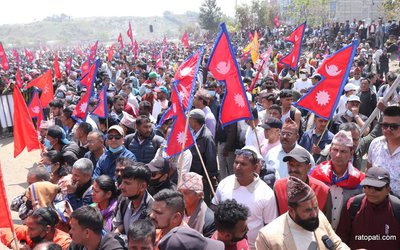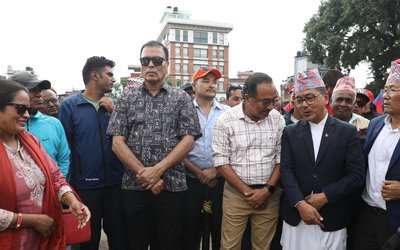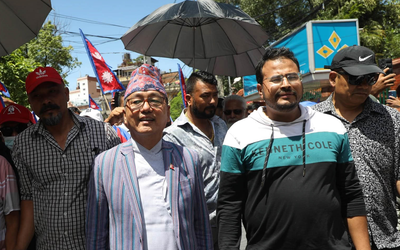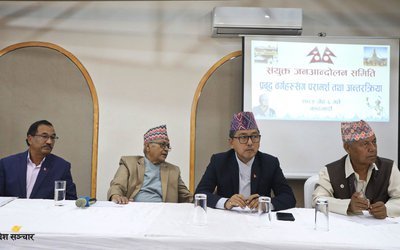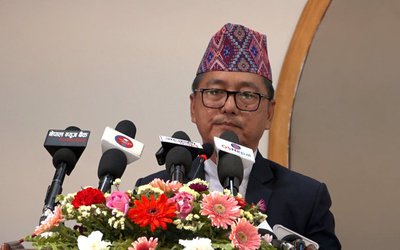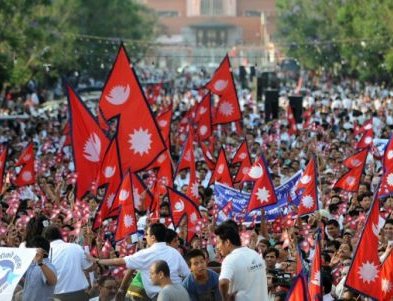
Nepal is experiencing crises, setbacks, and advances in the
democratization of institutionalized power, in which the forms of
representative democracy and participatory democracy are inscribed. Representative
democracy is considered an indirect democracy in which the people do not govern
because it is the citizens who elect the representatives who govern and
represent them. The representatives decide the policies and legislative acts of
the people. However, this type of democracy is directly and specifically linked
to participatory democracy, which then leads us to generate real representative
democracy. This representative democracy leads to participatory democracy.
Everything that is directed against that system will be unjust, create terror, destabilizing, revolutionary, detestable and undemocratic.The parties that represent 55% of the voters will continually give legitimacy to the system because, winners or losers, they all take out a succulent piece of the pie of power.
After all, representative democracy is nothing more than the well-planned and disguised dictatorship of the representatives. It is easier to consider legitimate resistance against a dictatorship than against a supposed democracy. Representative democracy is the disguise of the dictatorship of the private interests of the representatives. It is of utmost importance to remove that disguise among all.
It has a deficiency that would be caused by the lack of
sufficient receptivity on the part of the representatives. There is a need to reinforce
the line of communication between citizens and their representatives, as this
communication is an essential pillar of democracy. Nationalism and the
democratic system are two different realities. One is based on the passionate
defense of one's own and the other on the rational negotiation of differences.
It is very difficult for nationalism to understand the
relationship between democracy and the constitution since it considers that the
Fundamental Rule can do nothing when it comes to containing the will of the
nation unequivocally expressed by any procedures that may take place.
Our democracy is caught between nationalism and federalism.
On the other hand, populism and nationalism threaten democracy. Our
representative democracy no longer represents the people. In reality, democracy
in Nepal does not exist, neither as a value, nor as a spirit, or as a social
necessity. BP Koirala was correct in his time but his ideology was never
evolved. It is high time we ditch representative democracy and move forward to
direct democracy.
Undoubtedly, democracy is the best model of political
organization humanity has found. However, as it was introduced within the
context of capitalist productive relations, it lives in permanent crisis. By
their own internal logic, such relations produce social inequalities and
exclusions that corrode the very idea of democracy. If participatory democracy
gains ground, the institutions of representative government could lose part of
their power in favor of the new participatory sphere.
Based on a reflection on the limitations faced by democracy
in the context of current globalization, we have to analyze the possibilities
of a new relationship between people, collectives and state institutions. This
serious evil affects not only the democracy in our country but also many other
latitudes, where the possibility to recycle the groups and interests of society
could be sacrificed. This possibility is the basis of democracy itself.
The question of the viability of democracy becomes very
complex when the structures of power and domination cannot be given the minimum
example of probity, good sense and balance in decisions. This puts the
long-term objectives before the conjuncture. These objectives allow building a
fair society, with development options for citizens.
Do we have a healthier democracy in Nepal because its
citizens are ready to mobilize for what they believe is right? Or is it because
of their concerns and interests? Or is politics on the street a signal
ofeverything that does not work well?
Freedom and democracy cannot just be an ideological
duty.Those who care for democracy and freedom should not use democracy and
freedom to divert discredited policies. Democracy and freedom are not a
gerontocratic system. It is a system of constant change of people in power. It
is a system in which people need to offer alternatives, future, new look and
new people.
It has not become a government of the people and for the
people, but a tool by which power dominates the people. It can be said that
democratic institutions, such as elections, serve as a mechanism to ensure the
persistence of the authoritarian system and the effectiveness of its action on
society. In principle, the separation of power between the judiciary (the
court), the legislature (parliament), and the administration (government) is a
fundamental principle of democracy.
In Nepal, we hardly see athe separation between these three powers. People live in poverty and enormous oppression. Journalists and politicians talk about democracy. The true form of government is, of course, completely oligarchic. The most basic physical problem of democracy is that no one is ever responsible. Voters make their choice but their choice is limited in advance. Their choices remain secret and they will not face the consequences of their choice alone. A voter travels in wagons to vote and everyone blames each other for the outcome. It encourages corrupt voting behavior by destroying accountability. The cost of any measure is shared by society as a whole, which encourages the more wealthy to vote for the absurd costs that can be transferred to others. The other burden will only become heavier.
No matter what people vote for, how smart they are, or
whether they are good humans or not, they will eventually become accustomed to
ineffectiveness and consider life as a gamble rather than a meaningful
achievement of the goals. They give up the information and rely on opinions,
and then exclude all competing views. Because honesty is a bad investment, they
become passive-aggressive manipulators, which tell us about corruption and fish
voters with guilt, sense of humor, shame, pity, and fear.
Our representative democracy no longer represents the people.
We are facing a serious problem when it comes to leadership. Personalities play
an important role in every aspect of our lives. It is more than obvious that
there is a lack of strong personality in politics. A strong personality is
required to develop strong and diverse political leaders.
Freedom and democracy cannot be an ideological duty. In
reality, democracy in Nepal does not exist as a value, or a spirit, and neither
as a social necessity.

Deepak Raj Joshi
(The author is a lecturer and IT consultant. He also writes fiction under the name of Kapeed Joshi. He can be reached by email at info@dipakjoshi.com.np.)
- Criminal Governance & Neopatrimonialism
- Jul 29, 2024
- Participatory Democracy
- Dec 07, 2023
- Rise Of Populism Boon Or A Bane
- Aug 13, 2023
- The Collapse Of Confidence And The Rise Of RSP
- May 17, 2023
- Lottocracy
- Apr 30, 2023
